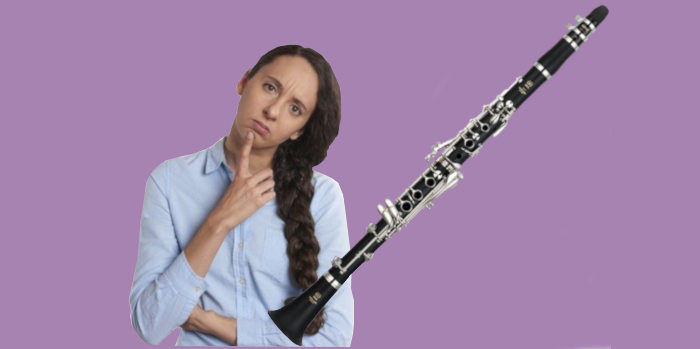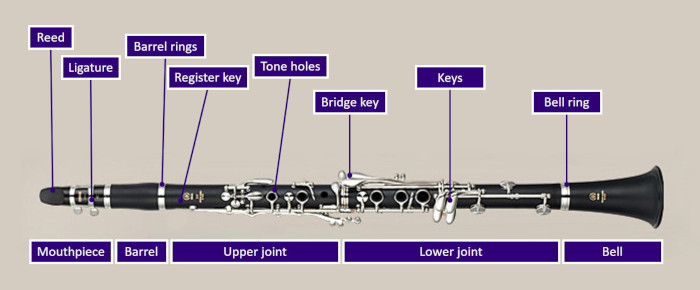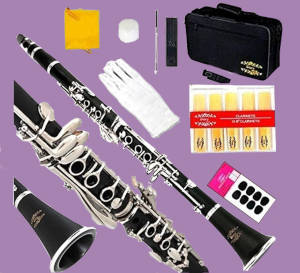
This post may contain affiliate links and we may receive compensation if you purchase products linked to below. As an Amazon Associate, we can earn from qualifying purchases. Please see our Terms and Conditions for details.
You might be wondering whether the Yamaha YCL-255 clarinet is really worth the money.
And the truth is, I can’t say for sure whether it’s worthwhile for you.
We’ve only known each other for, what, 5 seconds?
But if you read on, I can say you’ll leave here much better prepared to make that decision for yourself.
Whether you’re buying a clarinet for yourself or someone else, I’ll tell you everything you need to consider when looking at different models and how the YCL-255 measures up.
Before we get to the specifics of the clarinet itself, let’s take a look at the brand behind the instrument.
The Yamaha brand
Yamaha is one of the most respected brands in the musical instrument industry. The company was founded in Japan more than 130 years ago as a piano and reed organ manufacturer.
The company grew to produce many different types of instruments and equipment and became a conglomerate in the process.
Today Yamaha is the world’s largest musical instruments manufacturer. Many small or no-name brands you see in the clarinet space may be difficult or impossible to reach if you find a problem with their product. But with offices around the world, including the United States, Yamaha tends to have fairly responsive customer service.
Yamaha’s longstanding reputation makes it a solid choice for a new clarinet. Millions of musicians from students to professionals continue to rely on the brand for reliable quality and service.
Key criteria for rating the YCL-255
As the successor to the YCL-250, the 255 is a great clarinet. In fact, it was among the top-rated student clarinets of the 15 models we reviewed. But of course, the decision to buy a clarinet is not that simple.
Pros
- Rich, warm sound
- Great tone and responsiveness
- Durable keys
- Decent mouthpiece
Cons
- Expensive
- Limited accessories included
Music teachers and experienced musicians typically use several criteria to evaluate an instrument before they buy. You should find some or most of the following will apply to your own buying situation as well:
1. Price
Price is often the most obvious consideration for anyone buying a clarinet. But it shouldn’t be the only one.
Focusing too much on the upfront cost of a clarinet can actually lead you to squander money. Many cheaper instruments are hard or impossible to play at all or can easily break with regular play.
Not surprisingly, the instruments with better quality that last longer tend to be the more expensive variety. This Yamaha student clarinet is no exception.
The Yamaha YCL-255 often sells for $950-$1,000 or more, though we’ve found it selling for a few hundred dollars less in some stores, including Amazon.
2. Play-ability
A clarinet’s ease of play, or play-ability, is a major consideration for anyone picking up the instrument for the first time.
One of two things usually happens when a beginner clarinetist starts on a hard-to-play instrument:
- They persevere through learning the basics of clarinet for a couple years and then excel when they upgrade to a better clarinet; or
- More often, they get discouraged from struggling with their first clarinet and soon give up
If you’d prefer to limit the risk of the latter, Yamaha’s YCL-255 is a great choice.
Whereas it can be challenging just to get some clarinets to produce a sound, the YCL-255 is responsive and smooth to handle. Its adjustable thumb rest make it easier for musicians with differently sized hands to play.
Many students used to practicing on a lower quality instrument are often pleasantly surprised at how much easier it is to play this Yamaha student clarinet.
3. Clarinet durability
Clarinets range widely in how well they hold up over time. The body of most clarinets is either made of a special wood or one of a few plastics. The main differences are:
- Wooden models are known for a particularly rich sound but are also much more delicate than plastic models.
- Plastic models are normally less expensive and more durable than wooden ones.
Professionals tend to invest in a more expensive wooden clarinet. But most music teachers like myself suggest going for a plastic model for a first-time player.
Another part to focus on when it comes to durability is the clarinet’s keys. The keys are almost always metal—typically nickel or silver. But depending on the quality of the metalwork, the keys on your clarinet can be either sturdy or flimsy and likely to bend or break.

Similar to keys, be aware of the pads installed on whatever clarinet you buy. The pads of a clarinet are what form the seal over the tone holes on the instrument when the relevant keys aren’t being pressed. Without decent pads and proper construction, musicians can experience tone issues and air leaks.
The YCL-255 is a reliable and durable model when it comes to all of the above. Its ABS resin body helps prevent damage from mishandling or dropping the instrument. Its keys won’t bend or break under the pressure of normal play. And it comes with Valentino pads, which are durable and relatively easy to repair.
This beginner clarinet lasts many musicians several years or more as they advance into intermediate playing and beyond.
4. Sound
Quality clarinets play with a rich, warm sound to them. They have decent projection. And they’re consistent at different tones as the player moves to higher and lower registers.
Clarinets that aren’t good quality tend to have a more muffled sound. They’re also usually harder to play well or fall out of tune as the player changes registers.
Plastic models often lean toward the more muffled end of the spectrum. But the Yamaha YCL-255 has exceptionally good sound for a plastic clarinet.
Yamaha modeled the YCL-255 after their own professional wooden clarinets. The result is a clarinet that offers the best of both materials—the durability of a quality plastic clarinet and a great sound close to a wooden model’s.
5. Commitment to playing clarinet
How committed is the person you’re buying a clarinet for?
More specifically:
- Do they have any experience playing other instruments?
- Does this person have a burning desire to learn to play the clarinet? Or is it more of a passing interest?
- Do they have many other commitments likely to keep them from being able to practice playing regularly?
There are all important questions that should affect your decision about which clarinet to buy, or whether to buy one at all.
The Yamaha YCL-255 is not a great choice for someone who is just mildly curious about the clarinet. This model is better suited for someone passionate about learning to play and committed to learning for at least a couple years.
6. Accessories included with the clarinet
Clarinets can include a variety of accessories to make playing and maintaining the instrument easier. Some clarinets include everything from cork grease and spare reeds, to short lesson books, a carrying case and an extra barrel for tuning.
Many of these “free” accessories included when buying a less expensive student clarinet are often poorly made, especially the reeds. But they’re still helpful for the first-time clarinet player who may not know what accessories they’ll need.

The Yamaha YCL-255 clarinet doesn’t usually come with much else apart from the clarinet itself and perhaps a carrying case.
But spending an extra $10-20 on some cork grease and decent reeds (Rico strength 2.5 are good for most beginner clarinet players) if you don’t have those already should be all that’s needed to start playing.
7. Manufacturer’s warranty
An agreement from the manufacturer to repair, replace or refund a defective instrument is an excellent benefit when buying a clarinet. It lowers risk for you as a buyer by protecting you in case there’s a problem with the product.
Lucky for Yamaha fans, this manufacturer goes above and beyond the warranty of even a typical “good” brand.
Here’s the deal:
When you buy a Yamaha YCL-255 clarinet from an authorized dealer in the United States, Yamaha protects you against defects in workmanship or materials for 5 years!
Again, the YCL-255 is a clarinet that lasts most musicians several years or more. And the included warranty is just one of the many benefits that make this clarinet one of the best-value models available.
Specifications
In case you’re a stickler for details, here’s a list of the specs for the YCL-255:
- Level: Standard
- Key of: Bb
- Fingering: Boehm
- Key system: 17 keys, 6 rings
- Barrel length: 65mm
- Body material: Matte ABS resin
- Key material: Nickel silver
- Plating: Nickel
- Bore: Molded
- Tone holes: Straight tone holes with tapered undercut
- Thumb rest: Adjustable with strap ring
- Mouthpiece: Yamaha 4C
- Mouthpiece cap: Plastic
- Ligature: Nickel-plated
- Pad type: Valentino
- Spring type: Stainless steel
- Posts: Threaded
The bottom line: Should you buy a Yamaha YCL-255?
If you’re looking to surprise your son, daughter, niece or nephew with an instrument you’re not sure they’ll want to play, then this model’s probably not for you.
And if you’re looking for a beginner clarinet that just barely plays but won’t cost you more than about $100, I can recommend several alternatives.
But if you’re looking for a fine instrument for someone passionate about playing the clarinet, you’ve arrived. The Yamaha YCL-255 is easy to handle. It has a rich, full sound. It’s durable and reliable. In short, it’s a joy to play.
Leave a Reply